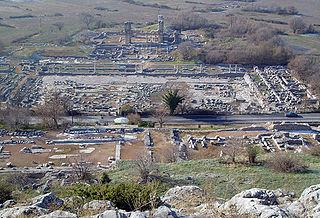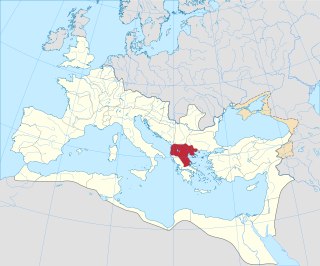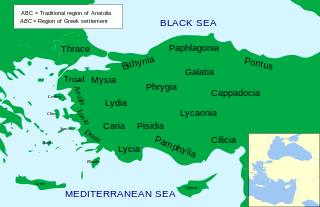
Marcus Antonius, commonly known in English as Mark Antony, was a Roman politician and general who played a critical role in the transformation of the Roman Republic from a constitutional republic into the autocratic Roman Empire.

Philippi was a major Greek city northwest of the nearby island, Thasos. Its original name was Crenides after its establishment by Thasian colonists in 360/359 BC. The city was renamed by Philip II of Macedon in 356 BC and abandoned in the 14th century after the Ottoman conquest. The present municipality of Filippoi is located near the ruins of the ancient city and is part of the region of East Macedonia and Thrace in Kavala, Greece. It was classified as a UNESCO World Heritage Site in 2016.

Lycia was a state or nationality that flourished in Anatolia from 15–14th centuries BC to 546 BC. It bordered the Mediterranean Sea in what is today the provinces of Antalya and Muğla in Turkey as well some inland parts of Burdur Province. The state was known to history from the Late Bronze Age records of ancient Egypt and the Hittite Empire. Lycia was populated by speakers of the Luwian language group. Written records began to be inscribed in stone in the Lycian language after Lycia's involuntary incorporation into the Achaemenid Empire in the Iron Age. At that time (546 BC) the Luwian speakers were decimated, and Lycia received an influx of Persian speakers. Ancient sources seem to indicate that an older name of the region was Alope.
This article concerns the period 359 BC – 350 BC.

Caria was a region of western Anatolia extending along the coast from mid-Ionia (Mycale) south to Lycia and east to Phrygia. The Ionian and Dorian Greeks colonized the west of it and joined the Carian population in forming Greek-dominated states there. Carians were described by Herodotus as being of Minoan descent, while he reports that the Carians themselves maintained that they were Anatolian mainlanders intensely engaged in seafaring and were akin to the Mysians and the Lydians. The Carians spoke Carian, a native Anatolian language closely related to Luwian. Also closely associated with the Carians were the Leleges, which could be an earlier name for Carians.

The Battle of Philippi was the final battle in the Wars of the Second Triumvirate between the forces of Mark Antony and Octavian and the leaders of Julius Caesar's assassination, Brutus and Cassius in 42 BC, at Philippi in Macedonia. The Second Triumvirate declared the civil war ostensibly to avenge Julius Caesar's assassination in 44 BC, but the underlying cause was a long-brewing conflict between the so-called Optimates and the so-called Populares.

Gaius Cassius Longinus, often referred to as simply Cassius, was a Roman senator and general best known as a leading instigator of the plot to assassinate Julius Caesar on 15 March 44 BC. He was the brother-in-law of Brutus, another leader of the conspiracy. He commanded troops with Brutus during the Battle of Philippi against the combined forces of Mark Antony and Octavian, Caesar's former supporters, and committed suicide after being defeated by Mark Antony.

Philippi is a city in — and the county seat of — Barbour County, West Virginia, United States. The population was 2,928 at the 2020 census. In 1861, the city was the site of the Battle of Philippi, known as the "Philippi Races". Although a minor skirmish, this is considered the earliest notable land action of the American Civil War.
Heraclea, Heracleia, Herakleia, or Heraclia may refer to:

The Kingdom of Pergamon or Attalid kingdom was a Greek state during the Hellenistic period that ruled much of the Western part of Asia Minor from its capital city of Pergamon. It was ruled by the Attalid dynasty.

Publius Servilius Casca Longus was one of the assassins of Julius Caesar. He and several other senators conspired to kill him, a plan which they carried out on 15 March, 44 BC. Afterwards, Casca fought with the liberators during the Liberators' civil war. He is believed to have died by suicide after their defeat at the Battle of Philippi in 42 BC.

The Battle of Philippi formed part of the Western Virginia Campaign of the American Civil War and was fought in and around Philippi, Virginia, on June 3, 1861. A Union victory, it was the first organized land action of the war, though generally viewed as a skirmish rather than a battle. However, the Northern press celebrated it as an epic triumph and this encouraged Congress to call for the drive on Richmond that ended with the Union defeat at First Bull Run in July. It brought overnight fame to Maj. Gen. George B. McClellan and was notable for the first battlefield amputations. As the first of a series of victories that pushed Confederate forces out of northwest Virginia, it strengthened the Union government in exile that would soon create the new state of West Virginia.

Macedonia was a province of the Roman Empire, encompassing the territory of the former Antigonid Kingdom of Macedonia, which had been conquered by Rome in 168 BC at the conclusion of the Third Macedonian War. The province was created in 146 BC, after the Roman general Quintus Caecilius Metellus defeated Andriscus of Macedon, the last self-styled king of Macedonia in the Fourth Macedonian War. The province incorporated the former kingdom of Macedonia with the addition of Epirus, Thessaly, and parts of Illyria, Paeonia and Thrace.

Shabla is a town and seaside resort in northeastern Bulgaria, administrative centre of the Shabla Municipality part of Dobrich Province. Shabla municipality includes the following villages: Bojanovo, Chernomortsi, Durankulak, Ezerets, Gorichane, Gorun, Granichar, Krapets, Prolez, Smin, Staevtsi, Tvarditsa, Tyulenovo, Vaklino and Zahari Stoyanovo. As of December 2009, the town itself had a population of 3,586 inhabitants. It is situated on the Bulgarian Black Sea Coast in the vicinity of the salt-water Lake Shabla and Bulgaria's easternmost point, Cape Shabla.

The Liberators' civil war was started by the Second Triumvirate to avenge Julius Caesar's assassination. The war was fought by the forces of Mark Antony and Octavian against the forces of Caesar's assassins, led by Marcus Junius Brutus and Gaius Cassius Longinus, also called the Liberatores. The latter were defeated by the Triumvirs at the Battle of Philippi in October 42 BC, and committed suicide. Brutus would also commit suicide after the second part of the battle.
The 6th Indiana Infantry Regiment was an infantry regiment from the State of Indiana that served in the Union Army during the American Civil War. This regiment was the senior Indiana regiment of the Civil War, as it was numbered first in sequence after the five Indiana volunteer regiments which had served in the Mexican–American War. The regiment was originally mustered-in for a three-month period of service between April and August 1861, but after its initial term of service had expired it was re-formed in September 1861 for a further three-year period, before being mustered out in September 1864.
Loryma was an ancient town and episcopal see of ancient Caria, in Asia Minor. It is now listed as a titular see. Loryma was a fortified place with a port, close to Cape Cynossema, on the westernmost point of the Rhodian Chersonesus, in Caria. Its harbour was about 20 Roman miles distant from Rhodes and was belonging to the Rhodians. Strabo applies the name Loryma to the whole of the rocky district, without mentioning the town. The Larumna of Pomponius Mela and the Lorimna of the Tabula Peutingeriana perhaps refer to Loryma, although it is also possible that they may be identical with a place called Larymna mentioned by Pliny in the same district.
The Roman–Parthian Wars were a series of conflicts between the Parthian Empire and the Roman Republic and Roman Empire. It was the first series of conflicts in what would be 682 years of Roman–Persian Wars.

George Alexander Porterfield was a junior officer of United States forces in the Mexican–American War, colonel, in the Confederate States Army during the first year of the American Civil War and longtime banker in Charles Town, West Virginia, after the war. He was in command of Confederate forces at Philippi in northwestern Virginia, later West Virginia, when they were surprised and routed, though with only a few soldiers wounded or captured, by Union Army forces on June 3, 1861, near the beginning of the Civil War. After serving in staff and temporary field positions for 11 more months, Porterfield resigned from the Confederate Army because he lost his position in a regimental election. In 1871 he helped found a bank at Charles Town, West Virginia, which he served for many years. At his death, he was the third-last surviving veteran officer of the Mexican–American War.

Classical Anatolia is Anatolia during Classical Antiquity. Early in that period, Anatolia was divided into several Iron Age kingdoms, most notably Lydia in the west, Phrygia in the center and Urartu in the east. Anatolia fell under Achaemenid Persian rule c. 550 BC. In the aftermath of the Greco-Persian Wars, all of Anatolia remained under Persian control except for the Aegean coast, which was incorporated in the Delian League in the 470s BC. Alexander the Great finally wrested control of the whole region from Persia in the 330s BC. After Alexander's death, his conquests were split amongst several of his trusted generals, but were under constant threat of invasion from both the Gauls and other powerful rulers in Pergamon, Pontus, and Egypt.














